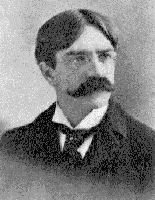Charles G.D. Roberts
Categories: Male Authors - Anglophone Authors - Poets - Southeast

Source: Library and Archives Canada
Biography
The “Father of Canadian Poetry,” Sir Charles George Douglas Roberts, was a poet and prose writer who also inspired the works of other poets of his generation, including Bliss Carman (his cousin), Archibald Lampman, and Duncan Campbell Scott. Together these four men became known as the “Confederation” poets.
Roberts was born on January 10, 1860 in Douglas, New Brunswick, and raised in Westcock near the Tantramar marshes, a landscape that dominated and inspired his work throughout his life. He graduated from the University of New Brunswick in 1879. From 1879 to 1895, Roberts worked as a teacher in Chatham and Fredericton, New Brunswick, as editor of the literary magazine The Week, and as a professor at King’s College in Windsor, Nova Scotia. Financially pressed, in 1897 he left his wife and family in New Brunswick and moved to New York, where prose writing would afford him a larger audience and better fees. In 1907 he moved to Europe, where he continued to write, though interrupted by service as a commissioned officer for the British Army during World War I.
Roberts published his first book of poems, Orion, and Other Poems, in 1880. Hailed as the beginning of a new epoch in Canadian letters, the notice it received abroad and the influence it had on his Canadian contemporaries makes Orion the most important of Roberts’ ten volumes of verse. Subsequent works include his finest poetry: In Divers Tones (1887) and Songs of the Common Day and Ave! An Ode for the Shelley Centenary (1893).
Roberts is credited along with Ernest Thompson Seton with the creation of the animal story, the one native Canadian art form. Volumes including Earth’s Enigmas (1896) and Eyes of the Wilderness (1933) draw upon his early experiences in the Maritimes. Poems such as “Tantramar Revisited” and “The Potato Harvest” are noted for their descriptive and meditative style.
Roberts returned to Canada and to poetry in 1925. His works from this time include The Vagrant of Time (1927) and The Iceberg and Other Poems (1934). Having settled in Toronto, his immense popularity allowed him to lecture throughout Canada, and he continued to do so until his death.
Elected a Fellow of the Royal Society of Canada in 1890, Roberts was an active member and awarded the Lorne Pierce Medal for distinguished service to Canadian literature in 1926. He was knighted in 1935. Sir Charles G. D. Roberts died in Toronto on November 26, 1943, regarded as Canada’s leading man of letters. He is remembered as a prolific and versatile writer who inspired a generation and initiated the first significant poetic movement in Canada.
How has New Brunswick influenced your work?
Pierce: What did you read mostly in your boyhood?
Roberts: I read everything in my father’s library. He turned me loose among his books. I became an omnivorous reader, and I read for pleasure, steeping myself in books because they were necessary to my happiness. I read history because I loved the sweep of events, but little biography. I did not care for isolated details or the analysis of them. I read lots of fiction, but I read more verse than anything else.…
Pierce: Were you writing then?
Roberts: I began things tentatively while I was by the Tantramar. The country around entered into me, and always when I return I can feel the early thrill of its spaciousness, its vast, wild, simple colour. I was an out-of-doors boy, even though I read so ardently.
Pierce: Were you concerned with the great problems of the universe, with life and death, and immortality, as most young writers are?
Roberts: Yes, but with no intention of writing about them. I knew that my thoughts upon such subjects were not of importance, that I had no contribution to make, but even then I felt acutely that I did have something to say about the tides and the marshes and all the moving beauty around me. I was thrilled with it all.
|
Literary Prizes |
|
|---|---|
| Knighted - 1935 | |
| Lorne Pierce Medal, Royal Society of Canada - 1926 | |
| Fellow of the Royal Society of Canada - 1893 |
|
Featured Publication |
||||
|---|---|---|---|---|
|
The Selected Poems of Sir Charles G. D. Roberts (1955) |
Excerpt: "The Salt Flats" Here clove the keels of centuries ago Where now unvisited the flats lie bare. Here seethed the sweep of journeying waters, where No more the tumbling flood of Fundy flow, And only in the samphire pipes creep slow The salty currents of the sap. The air Hums desolately with wings that seaward fare, Over the lonely reaches beating low. The wastes of hard and meager weeds are thronged With murmurs of a past that time has wronged; And ghosts of many an ancient memory Dwell by the brackish pools and ditches blind, In these low-lying pastures of the wind, These marshes pale and meadows by the sea. *samphire = small coastal plants From: Songs of the Common Day, 1893. |
|||
Find this author in the New Brunswick public libraries catalogue.
Source(s):

